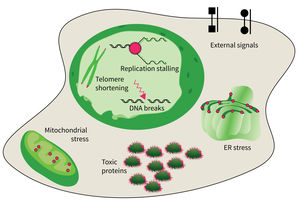Subarea 4: Cell Dynamics and Molecular Damages in Aging
The research focus of Subarea 4 is on studying damages of macromolecules (proteins, nucleic acids) and determining the structure-function relationship of biomolecules relevant to damage and damage repair processes and responses to molecular damage that might lead to aging and aging-associated pathologies.
The studies are focused on the following research areas: DNA replication, DNA damage responses (DDR), stress responses, metabolic stresses, protein trafficking and protein damages.
The research is defined by four focus areas:
- DNA damage response in tissue homeostasis and neuropathies,
- Quality control in the endoplasmic reticulum for secretory pathway in aging processes,
- Intrinsic and extrinsic factors implicated in cellular decline during aging, and
- DNA replication and genomic integrity preventing premature aging and diseases.
Research focus of Subarea 4.
The accumulation of damaged macromolecules or subcellular organelles is associated with dysfunction of a cell, which contributes to tissue & organ failure. DNA damage, genomic instability, protein misfolding or defects in toxic protein degradation can compromise cell functionality. Alterations of mitochondrial DNA and protein complexes affect cellular metabolism, which will have a general impact on cell integrity.
Publications
(since 2016)
2016
- S100A11 plays a role in homologous recombination and genome maintenance by influencing the persistence of RAD51 in DNA repair foci.
Foertsch F, Szambowska A, Weise A, Zielinski A, Schlott B, Kraft F, Mrasek K, Borgmann K, Pospiech** H, Grosse F, Melle** C
Cell Cycle 2016, 15(20), 2766-79 ** co-corresponding authors - Structure determination of peptide-heme complexes
Goradia N
Dissertation 2016, Jena, Germany - (1)H, (13)C, and (15)N resonance assignments for the pro-inflammatory cytokine interleukin-36α.
Goradia N, Wißbrock A, Wiedemann C, Bordusa F, Ramachandran R, Imhof D, Ohlenschläger O
Biomol NMR Assign 2016, 10(2), 329-33 - DNA damage tolerance pathway involving DNA polymerase ι and the tumor suppressor p53 regulates DNA replication fork progression.
Hampp S, Kiessling T, Buechle K, Mansilla SF, Thomale J, Rall M, Ahn J, Pospiech H, Gottifredi V, Wiesmüller L
Proc Natl Acad Sci U S A 2016, 113(30), E4311-9 - Mre11 Is Essential for the Removal of Lethal Topoisomerase 2 Covalent Cleavage Complexes.
Hoa NN, Shimizu T, Zhou ZW, Wang ZQ, Deshpande RA, Paull TT, Akter S, Tsuda M, Furuta R, Tsusui K, Takeda S, Sasanuma H
Mol Cell 2016, 64(3), 580-92 - Human DNA polymerase α interacts with mismatch repair proteins MSH2 and MSH6.
Itkonen HM, Kantelinen J, Vaara M, Parkkinen S, Schlott B, Grosse F, Nyström M, Syväoja JE, Pospiech H
FEBS Lett 2016, 590(23), 4233-41 - Der Aminoterminus der menschlichen RecQL4-Helikase : von der biochemischen Charakterisierung zur biologischen Funktion
Keller H
Dissertation 2016, Jena, Germany - Cdc45 is limiting for replication initiation in humans.
Köhler C, Koalick D, Fabricius A, Parplys AC, Borgmann K, Pospiech** H, Grosse** F
Cell Cycle 2016, 15(7), 974-85 ** co-senior authors - High-Content Microscopy Analysis of Subcellular Structures: Assay Development and Application to Focal Adhesion Quantification.
Kroll* T, Schmidt* D, Schwanitz G, Ahmad M, Hamann J, Schlosser C, Lin YC, Böhm KJ, Tuckermann J, Ploubidou A
Curr Protoc Cytom 2016, 77, 12.43.1-12.43.44 * equal contribution - Solvent Removal Induces a Reversible β-to-α Switch in Oligomeric Aβ Peptide.
Kumar ST, Leppert J, Bellstedt P, Wiedemann C, Fändrich** M, Görlach** M
J Mol Biol 2016, 428(2 Pt A), 268-73 ** co-corresponding authors









